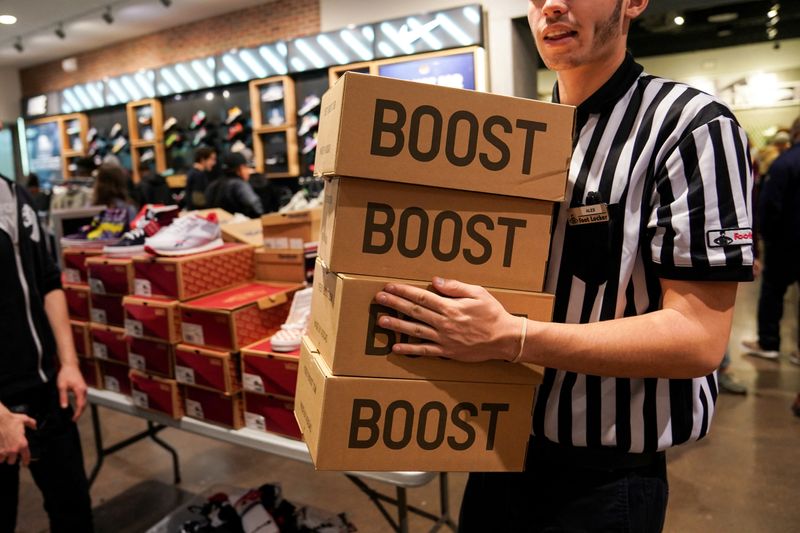By Ananya Mariam Rajesh and Savyata Mishra
(Reuters) - As the holiday shopping season approaches, major U.S. retailers from Dollar General (NYSE:DG) to Walmart (NYSE:WMT) and Macy's (NYSE:M) could be saddled with too much stock for a second straight year, according to a Reuters analysis, jeopardizing retailers’ profit margins and generating steep discounts for shoppers.
LSEG Workspace, a financial news and data platform, calculated inventory turnover ratios of 30 major U.S. retailers for Reuters. To determine which chains are most vulnerable to carrying excess stock - a problem that raises retailers' costs - LSEG divided each retailer's cost of goods sold by the average value of its inventory in the second quarter.
Stuffed stockrooms are especially challenging for retailers this year because American shoppers are expected to spend just 3% to 4% more this season, roughly on par with inflation. That would represents the slowest pace of growth in five years, according to industry estimates.
"I am relatively pessimistic about the holiday season," said Gerald Storch, retail consultant and former Target vice chairman and ex-CEO of Hudson (NYSE:HUD)'s Bay. "It's possible that some retailers could be overly optimistic and make that mistake of buying too much yet again."
Carrying too much inventory is a problem for many retailers because it drives up retailers' expenses for handling, storing and transporting products, said Jeff Bornino, North America President at TMX Transform, and a former supply chain executive at Kroger (NYSE:KR). "The undeniable reality in retail is that 15-20% of products occupying store shelves need to go," he said.
According to the Reuters analysis, two-thirds of the 30 retailers, including sporting goods company Foot Locker (NYSE:FL) and beauty store Ulta Beauty (NASDAQ:ULTA) had inventory turnover below their peers, indicating either slow sales or excess stock.
The finding is notable because history may be repeating itself for some of the chains. Inventory gluts hit many retailers' gross margins and profits last year when shoppers paused discretionary purchases due to high inflation.
While most retailers, including Foot Locker and Target, are carrying lower inventories from last year according to quarterly reports, the LSEG data on inventory turnover shows their levels are still high.
This is especially acute for dollar stores, department stores and clothing and accessories chains, the analysis showed. Department stores' holiday season is "likely not going to be that strong," said David Swartz, a Morningstar analyst.
Dollar General, TJX Companies (NYSE:TJX) and Dick's Sporting Goods (NYSE:DKS) declined to comment on their turnover ratios compared to their peers. Dollar Tree (NASDAQ:DLTR), Walmart, Best Buy (NYSE:BBY), Macy's, Foot Locker and Ulta did not respond to Reuters' questions about their inventories. Target pointed to its CFO's recent remarks that it embraced a "cautious planning approach" and that its second-quarter inventory was down 17% compared to a year earlier.
To be sure, inventory turnover is not the only metric Wall Street investors use to judge retailers' inventory levels. Some investors will personally visit stores to check inventory levels and to measure the frequency and depth of retailers' discounts to clear out merchandise. Others pay attention to a retailer's quarterly margin. A decline in margin could signal that a retailer dramatically slashed prices to pare back a glut.
The possibility of another year of retail inventory gluts has prompted worry among investors who own shares of retailers.
"Inventories have been a roller coaster for large U.S. retailers," said Jason Benowitz, senior portfolio manager at CI Roosevelt, which holds shares in Home Depot (NYSE:HD).
Retailers need to use promotions and discounts to drive traffic to the stores, Telsey Advisory Group analyst Joseph Feldman said. Some are already slashing prices and dangling discounts to clear excess inventory before Black Friday, the start of holiday shopping season.
Research firm Jane Hali & Associates said discounts at Kohl's (NYSE:KSS) and Macy's were as high as 60%, with foot traffic lower at these two retailers and Nordstrom (NYSE:JWN) compared to last year. Kohl's and Nordstrom did not respond to requests for comment.

As shoppers turn cautious due to financial strains such as high interest rates and a resumption of student loan repayments, some retailers are offering holiday discounts earlier than usual, said Brian Mulberry, client portfolio manager at Zacks Investment Management, which owns Walmart shares.
"And that is simply driven by the fear that the consumer, by the end of the year, could be in a weaker state," he said.